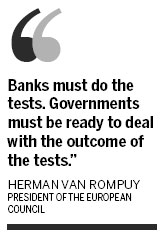Economy
EU leaders agree on austerity measures
Updated: 2011-03-26 07:32
(China Daily)
|
|
Euro countries move toward more economic coordination
BRUSSELS - European Union leaders have endorsed a long-prepared package of austerity measures to shore up the euro and sustain economic growth after an intensive discussion at the two-day spring summit.
The measures have been decided amid avid demonstrations and the resignation of Portugal's prime minister on Wednesday night after the parliament in Lisbon rejected a fourth austerity plan.
"We took important decisions today," Herman Van Rompuy, president of the European Council, told reporters early Friday.
"We confirmed the operational features of the permanent Stability Mechanism. We will make sure that 500 billion euros ($707 billion) is available to those with triple-A status. We have agreed to ensure that the temporary facility has an effective lending capacity of 440 billion euros. It will be in place in June. Finally, in order to repair the financial sector, we underline the importance of credible stress tests.
"Banks must do the tests. Governments must be ready to deal with the outcome of the tests."
Van Rompuy said in respect to the economy: "Some people fear this work is about dismantling welfare states and social protection - not at all. It is to save it. What we must do is to make sure that our economies are competitive enough to create jobs and to sustain the standard of living for all our citizens - that's what our work is about."
The president said that the governance and competitiveness pact, which will be in effect starting in mid-2013, will be called the "Euro Plus Pact", as the six EU members that are not among the 17 eurozone countries have agreed to economic coordination.
Sources said that Germany's demand to delay the period over which it is supposed to pay into the eurozone's new bailout fund had delayed the summit deal on a "comprehensive package" of economic reforms.
Several hours of discussions only brought about an in-principle deal, one source said. Experts from eurozone countries had been asked to hold a special meeting at the summit to address Germany's concerns.
The discussions centered on providing 500 billion euros in funding for the European Stability Mechanism, which will start in mid-2013.
On Monday, EU countries decided that euro states would have to back it up with 80 billion euros in capital rather than just loan guarantees, as is the case with the current euro fund, the European Financial Stability Facility.
Euro states were asked to pay half of the sum in 2013 and the remaining 40 billion euros in the following three years.
But Germany would like to break it down into five equal payments distributed over a longer period, diplomats said, to reduce the impact that payments would have over its debt and deficit figures.
At one point, the summit was overshadowed by Portuguese Prime Minister Jose Socrates' resignation on Wednesday night after the country's parliament voted against his new round of austerity measures, which were aimed at reducing the high budget deficit to avoid a bailout.
The Portuguese government announced a series of adjustment measures during the past year to underline its commitment to reduce the budget deficit from 7.3 percent of GDP in 2010 to 4.6 percent in 2011.
The measures, which include pension reforms and tax hikes, have been strongly criticized by opposition parties, which claimed that the measures could further slow down the economic growth of the country.
Agencies-China Daily
E-paper

Green mission
Tony blair believes China will take a leading role to fight climate change and cut emissions.
Stepping on to success
French connection
Generation gaps
Specials

Have you any wool?
The new stars of Chinese animation are edging out old childhood icons like Mickey Mouse and Hello Kitty.

Fill dad's shoes
Daughter and son are beginning to take over the family business of making shoes.

Virtual memorial
High-Tech touches to traditional tombsweeping festival help environment.

